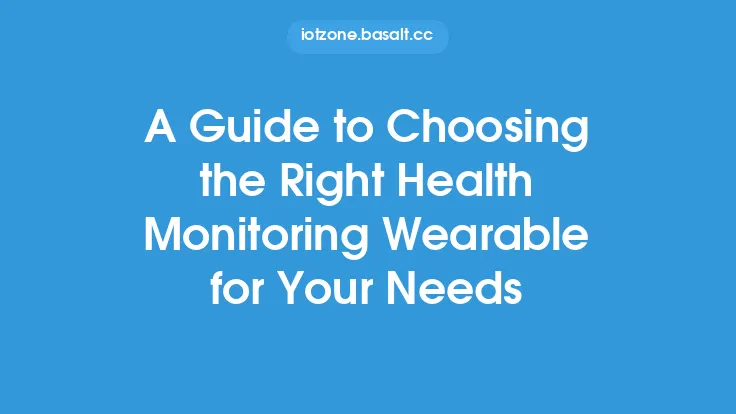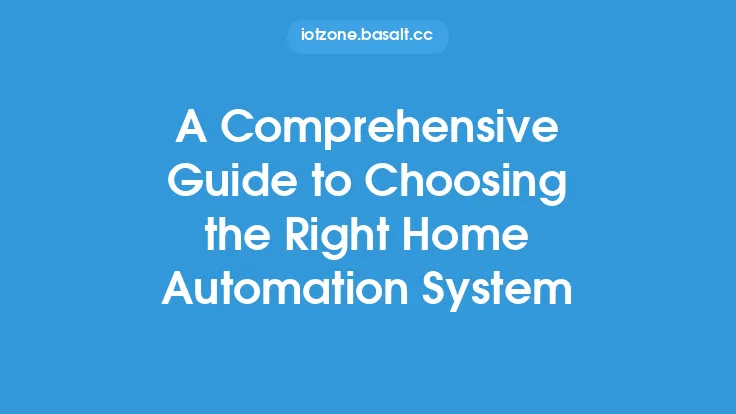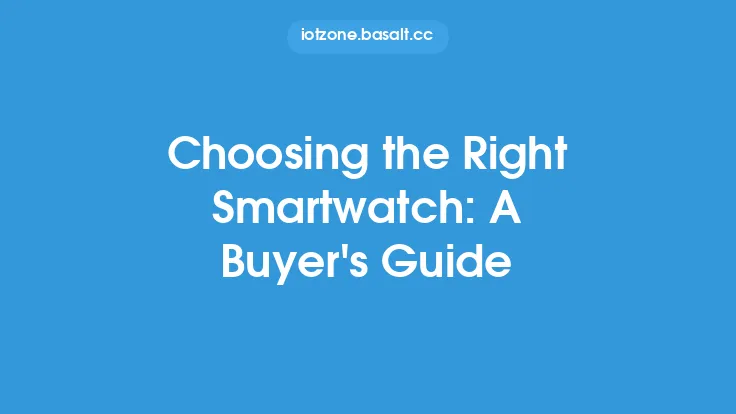When it comes to choosing the right fitness tracker, the options can be overwhelming. With so many different models and brands available, it's essential to consider your specific needs and goals before making a decision. In this article, we'll break down the key factors to consider when selecting a fitness tracker, including the type of device, features, compatibility, and price.
Understanding Your Needs
Before choosing a fitness tracker, it's crucial to understand what you want to achieve with the device. Are you looking to track your daily activity, monitor your heart rate, or optimize your workout routine? Different fitness trackers cater to different needs, so it's essential to identify your priorities. For example, if you're a runner, you may want a device with built-in GPS and advanced running metrics. On the other hand, if you're looking to track your sleep and recovery, a device with advanced sleep tracking features may be more suitable.
Types of Fitness Trackers
There are several types of fitness trackers available, each with its unique features and benefits. The most common types include:
- Basic fitness trackers: These devices track basic metrics such as steps taken, distance traveled, and calories burned. They're often affordable and easy to use.
- Smart fitness trackers: These devices offer more advanced features such as heart rate monitoring, GPS, and notification alerts. They're often more expensive than basic fitness trackers but provide more detailed insights into your activity.
- Smartwatches: These devices offer a range of features beyond fitness tracking, including music control, mobile payments, and app support. They're often more expensive than fitness trackers but provide a more comprehensive wearable experience.
- Hybrid fitness trackers: These devices combine the features of basic fitness trackers with the style of traditional watches. They're often more fashionable than traditional fitness trackers but may lack some advanced features.
Key Features to Consider
When choosing a fitness tracker, there are several key features to consider. These include:
- Heart rate monitoring: This feature allows you to track your heart rate in real-time, providing valuable insights into your physical activity.
- GPS: This feature allows you to track your location and distance traveled, making it ideal for runners, cyclists, and other outdoor enthusiasts.
- Water resistance: If you plan to wear your fitness tracker while swimming or engaging in water-based activities, look for a device with a high level of water resistance.
- Battery life: Consider a device with a long battery life to minimize the need for frequent charging.
- Compatibility: Ensure the device is compatible with your smartphone or tablet, as well as any other devices you plan to use with it.
- Display: Consider a device with a high-resolution display to make it easier to view your data and navigate the interface.
Compatibility and Integration
Compatibility and integration are essential considerations when choosing a fitness tracker. Ensure the device is compatible with your smartphone or tablet, as well as any other devices you plan to use with it. Also, consider the compatibility of the device with popular fitness apps and services, such as MyFitnessPal or Strava. Integration with other wearables or devices, such as smart scales or blood pressure monitors, can also be beneficial.
Price and Value
Fitness trackers can range in price from under $50 to over $500, depending on the features and brand. When considering the price, think about the value the device provides. A more expensive device may offer advanced features and better build quality, but it may not be necessary for your specific needs. On the other hand, a cheaper device may lack some features, but it may still provide excellent value for the price.
Brand and Reputation
The brand and reputation of the manufacturer are also essential considerations. Look for brands with a proven track record of producing high-quality fitness trackers, such as Fitbit, Garmin, or Apple. These brands often offer better build quality, more advanced features, and superior customer support. Additionally, consider the warranty and support offered by the manufacturer, as well as the availability of accessories and replacement parts.
Technical Specifications
When evaluating the technical specifications of a fitness tracker, consider the following:
- Processor: A faster processor can provide a more responsive user interface and faster data processing.
- Memory: A device with more memory can store more data and provide a more comprehensive picture of your activity.
- Sensors: Consider the types of sensors used in the device, such as accelerometers, gyroscopes, or heart rate monitors.
- Connectivity: Consider the types of connectivity options available, such as Bluetooth, Wi-Fi, or NFC.
- Operating System: Consider the operating system used by the device, such as Android Wear or watchOS.
Conclusion
Choosing the right fitness tracker can be a daunting task, but by considering your specific needs and goals, you can find a device that provides excellent value and helps you achieve your fitness objectives. Remember to evaluate the type of device, features, compatibility, price, brand, and technical specifications to make an informed decision. With the right fitness tracker, you can take your fitness journey to the next level and achieve a healthier, more active lifestyle.





